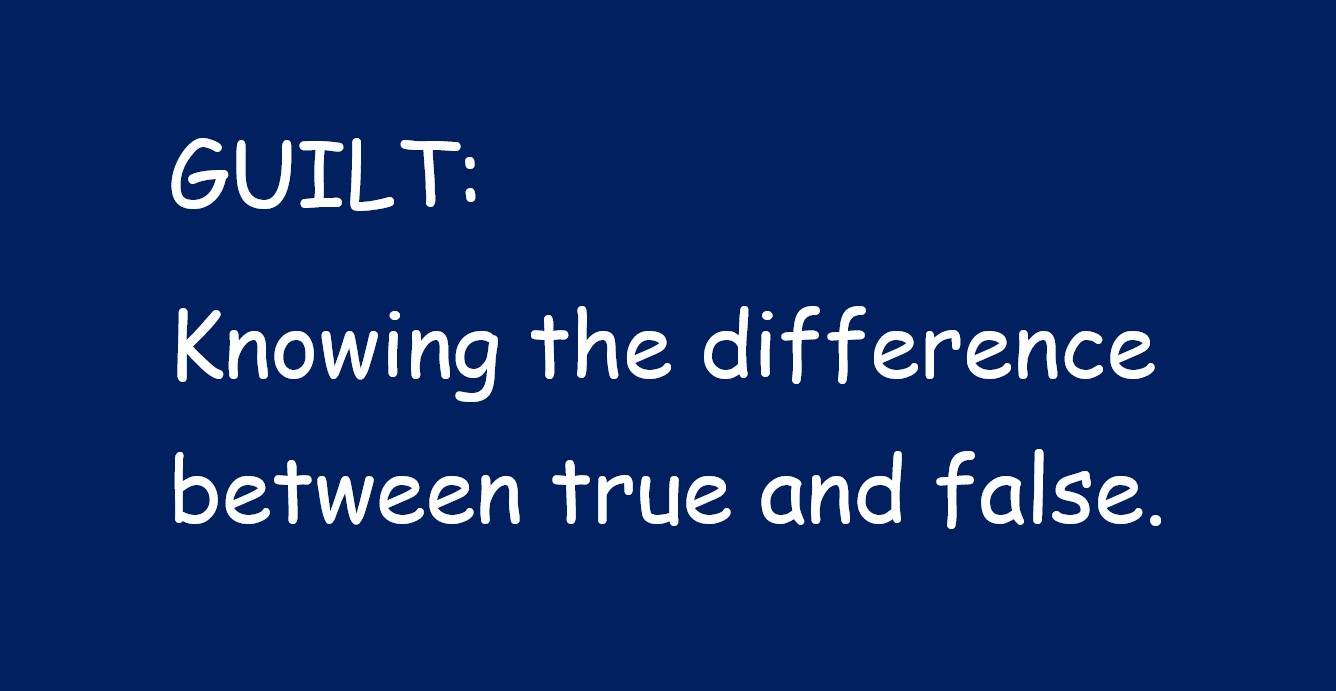
Over the past few years, healthcare professionals have consistently pointed to the lack of individual self-care as a serious mental health concern. Indeed, many Americans suffer from a self-care deficiency. Lack of self-care reduces our resiliency and ability to cope with stress and makes us vulnerable to increased anxiety and depression.
In my practice, I find that the lack of self-care is directly related to a person’s experience of personal shame and guilt. In other words, many folks feel that, because of this blight on their self-esteem, they are not deserving of or entitled to take care of themselves.
Given this connection, it is important to clarify some of the common misconceptions concerning guilt and shame.
Legitimate guilt
The term guilt can be associated with a legal process. A defendant in a court of law is found guilty or not guilty of breaking the law. In that sense, guilt is a legal judgment concerning something a person has done.
On a personal level, we feel guilty when we believe that we have done something that goes against our sense of right and wrong. For example, when we break a promise or commitment we feel guilty. The feeling is our conscience reminding us of our error and causing us to feel bad about it.
When we act in ways that go against what we believe is right, the experience of guilt is legitimate and deserved, Real guilt, in this context, can be a useful indicator to alert us of our moral breach and motivate us to correct our ways.
False Guilt and Shame
False guilt is a distorted perception in which we feel that we have done something wrong when we haven’t. This distorted feeling is harmful to our mental health. False guilt erroneously holds us responsible for something that was not our fault.
This type of false guilt comes from normal behaviors for which a person feels they are either wrong or responsible for problems or negative outcomes. Often these feelings are connected to traumatic events in childhood.
For example, a child may feel guilty for erroneously believing that they caused their parents’ divorce by their being disobedient or troublesome. Children often unconsciously take the blame in order to provide an explanation for the unthinkable trauma they are experiencing. Psychologically, feeling guilty is less horrific than embracing the chaos of the trauma.
Another type of false guilt (shame) goes beyond something that we have done and is about who we are. Unlike behavior-related guilt, shame feels hopeless. There is nothing we can do to get rid of shame.
Sadly, many folks suffer from a false but primal sense of inadequacy or inferiority. What is needed to treat a person in this situation is not to change the person’s behavior but for the person to become aware of the distorted self-assessment and change the way s/he thinks about themselves.
Some highly religious people often secretly feel this shame. Even though their faith tells them that God forgives them, they can’t feel acceptable. They feel that they are so bad that they are beyond forgiveness. While they profess a belief in a forgiving God, they secretly believe that they are beyond saving.
If you struggle with either of these types of false guilt and shame, here are some tips to help you vanquish these feelings and discover your innocence:
1) Discern: What are you feeling – false-guilt or shame ?
Toni Morrison observed that legitimate guilt seeks confession while shame needs to hide. In either case, if you want to stop feeling bad, stop hiding and start talking. If you feel shame and can recognize something that you did wrong, convert your feelings of shame to guilt and do something about it. Confess, repent and seek forgiveness.
If the problem is shame, ask yourself what is so bad about you that you are different than everyone else ? false guilt | Pastoral Counseling Syracuse NY (revmichaelheath.com)
2) Identify when the feeling first began.
Whether it’s false guilt or shame, no matter. Think about the situation or event about which you feel guilty. Be specific. Look for situations or events that were shocking difficult or tragic. Ask yourself whether, anyone blamed you or told you that something was your fault or that you were bad ? Children are often falsely blamed or told that they are bad when they aren’t . Their only crime was simply for acting like children.
3) Reality-Test the facts.
Reflect on the situation for which you feel shame: Were you really responsible? Did you really have control over the bad thing that happened?
People, especially children, have exaggerated expectations of what they can do or control. A careful review of what you thought that you could do will expose that your expectations may have been unrealistic.
Another good way to expose the distortion is to imagine your own child or acquaintance in the same situation and think if you would blame them for reacting the way you did. Reducing Both True and False Guilt | ME/CFS & Fibromyalgia Self-Help (cfsselfhelp.org)
_______________________________________________________________________
While these suggestions can be helpful, serious false guilt and shame can significantly impair functioning and may require professional help. That said, the first step in healing is to recognize that much of what you’re feeling is distorted, exaggerated and most likely not deserved. It is a truly liberating feeling to discover that you were and are innocent.
Rev. Michael Heath, LMHC , Fellow AAPC 3 3 2024



